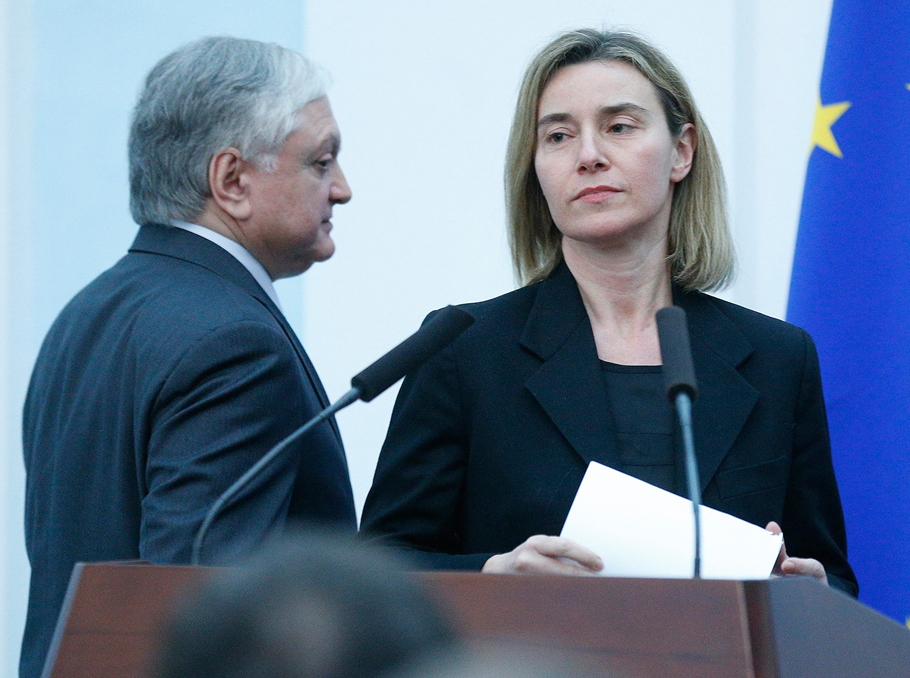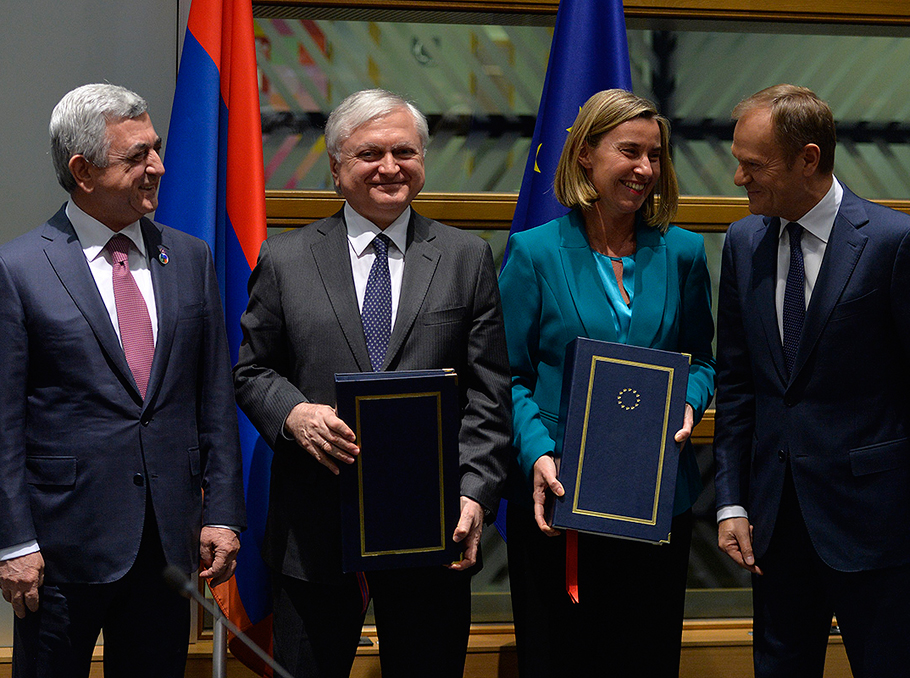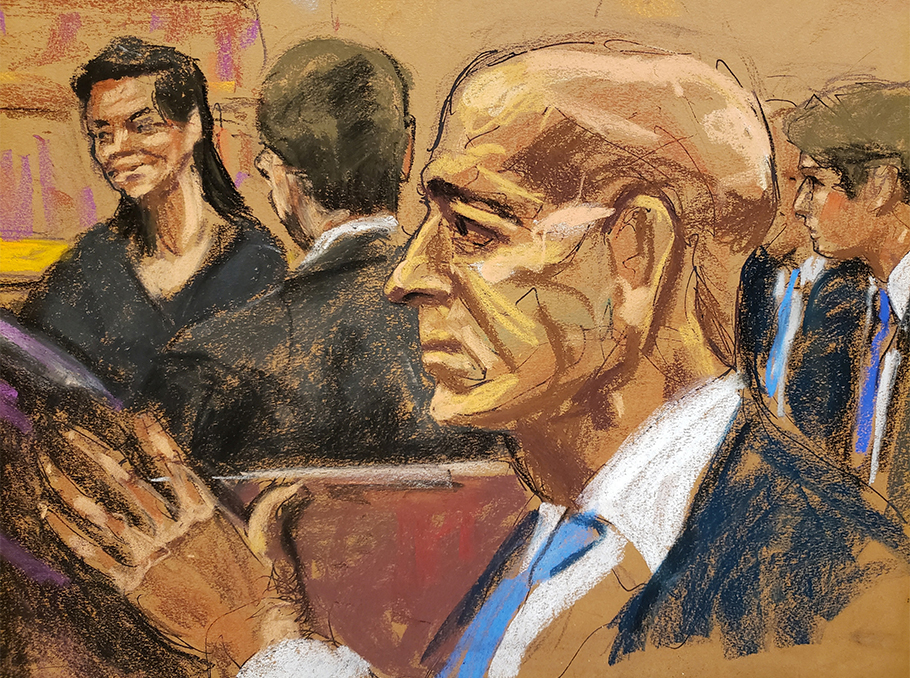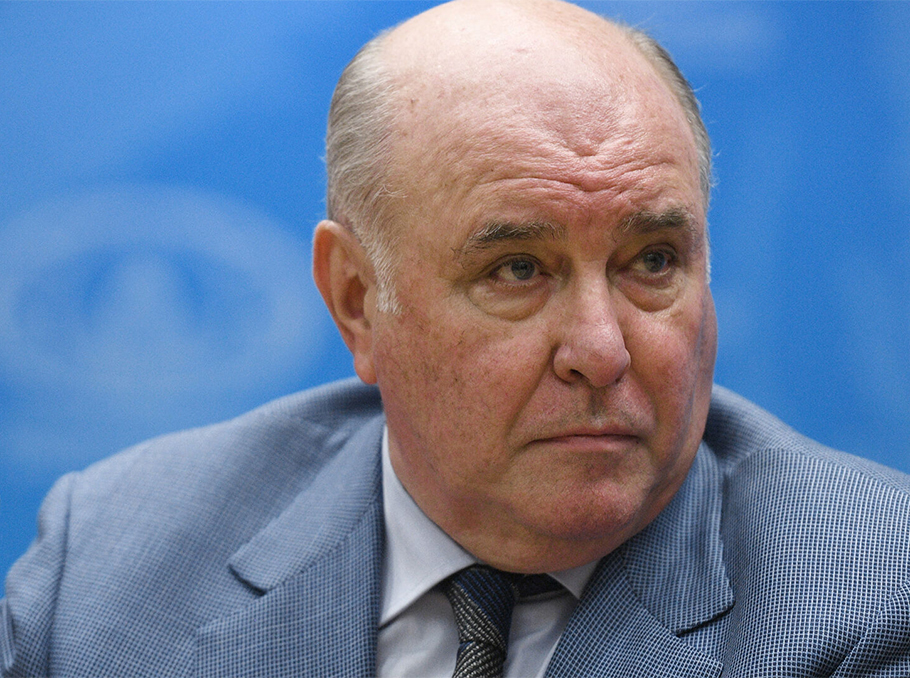Minister of Foreign Affairs of Armenia Edward Nalbandian and EU High Representative for Foreign Affairs and Security Policy Federica Mogherini signed the EU-Armenia Partnership Priorities in Brussels on February 21.
Having studied the document, in this edition of the Key Mediamax introduces answers to some of the most important points of EU-Armenia Partnership Priorities.
1. What role does this document allocate to civil society?
Civil society is an important actor in the context of the Eastern Partnership and the EU and Armenia will further facilitate its involvement in the implementation of these priorities.
The parties will also strive to further develop a favorable environment for civil society, including social partner’s organizations, and its participation in decision making. Civil society has been consulted on the establishment of these Partnership Priorities and will also play an important role by contributing to the monitoring of their implementation.
2. What changes do we expect in governance and judiciary?
The EU and Armenia are committed to further cooperation with the objective of the promotion of human rights and the rule of law, as well as the fundamental freedoms. They will work together towards continuous improvement of Armenian public administration, good governance and judiciary, step up the fight against corruption and strengthen civil society. Gender equality, environmental and social issues will be mainstreamed in all areas.
The parties will step up their efforts for the reform of public administration, including local authorities and law enforcement. Particular importance will be attached to the rule of law, promoting the independence of the judiciary, access to justice and the right to fair trial. This reform will begin with a strategic framework for public administration reform.
3. What approaches will be applied in fight against corruption?
The fight against corruption will be at the heart of administrative reform and the country’s effort to reinforce the rule of law. Cooperation will focus both on reinforcing the anticorruption bodies and reviewing legislation, in particular the public procurement system, the asset declaration system to ensure its proper implementation, and the management of public functions where economic and other stakes are highest (procurement, customs, permits) with a view to ensuring high ethical standards and avoid conflict of interest.
4. What steps will be taken to promote financial stability?
Banking supervision will be further strengthened according to international norms and best practices, to increase the robustness and the resilience of the financial sector. The modernization and reforms in customs and tax administration, including international cooperation and reinforcement of fight against fraud, will boost revenue collection.
5. How will Armenia’s business environment improve?
An investment environment supportive to business also includes effective competition in markets for products and services, ensured by a strong, independent competition authority operating to the highest ethical standards, with access to an effective enforcement mechanism for antitrust legislation and effective protection of intellectual property rights, including geographical indications. Mainstreaming ease of doing business in all policies will be instrumental to fostering growth.
Fostering the digital economy, including through the approximation of Armenia’s digital environment with the EU’s Digital Single Market, would be important for modernizing Armenia’s economy and society.
The green economy offers an important growth path for sustainable development. Environmental issues, including climate change, will be mainstreamed in all relevant policies.
6. How will Armenia’s entrance to global market be provided?
The document says that as a a land-locked country, Armenia needs to overcome the challenges to its connectivity. Also within the country, some areas suffer from remoteness and limited connections to centers of economic, political and social activity. Cooperation with the EU and other Eastern Partnership countries in the above areas, in particular Georgia, can contribute to alleviation of the consequences of the geographical situation of the country.
The parties will also cooperate in the framework of the extended core Trans-European Transport network (TEN-T), based on clear prioritization, to improve Armenia’s access to the international markets.
To ensure effective connections and market development beyond the immediate neighborhood, it is important to pursue civil aviation reform, eventually leading to the conclusion of an aviation agreement with the EU.
7. How will nuclear power plant and nuclear energy issues be regulated?
As long as nuclear energy is used to maintain an adequate level of energy supply in the country, ensuring high levels of nuclear safety is necessary: International Atomic Energy Agency (IAEA) standards and EU standards and practices, as referred to in the CEPA, shall serve as a basis.
Lastly, the closure and safe decommissioning of the Medzamor Nuclear Power Plant (MNPP) and the early adoption of a road map/action plan to this effect shall remain a key objective, taking into consideration the need for its replacement with new capacity to ensure Armenia’s energy security and conditions for sustainable development
8. How will migration issues be addressed?
Management of migration flows will be based on the Visa Facilitation Agreement / Readmission Agreement. The EU acknowledges Armenia’s role in settling refugees from Syria, making it eligible for support from the EU Regional Trust Fund in Response to the Syrian Crisis.
Marie Taryan
























Comments
Dear visitors, You can place your opinion on the material using your Facebook account. Please, be polite and follow our simple rules: you are not allowed to make off - topic comments, place advertisements, use abusive and filthy language. The editorial staff reserves the right to moderate and delete comments in case of breach of the rules.